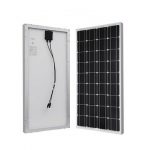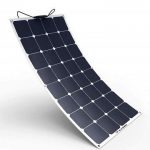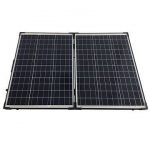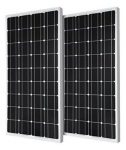Solar energy is an excellent investment for RVs.
It can pay for itself in the long run, and help you save some money.
Also, installing solar panels can increase your RV resale value.
Solar panels for RVs have a tough construction that will last for years.
They are an alternative way to reduce the energy costs and continue to use your electronics as you prefer.
Here are my recommendations for the best solar panels.
WindyNation 100 Watt Solar Panel Kit
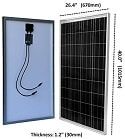
Experienced RVers are familiar with Windy Nation brand.
This kit comes with a solar charge controller and ensures outstanding wattage.
With multiple panels and ideal conditions, you can use it to run your RV 100% on solar energy.
The system comes with temperature sensors, a 40-feet cable, and an LCD display for intake and consumption monitoring.
The WindyNatuon kit gives 350 watts on a day and has a maximum output of 1.2 kilowatts.
Panels are good for use on the boat but aren’t suitable for home use.
Pros
- The LCD display is adjustable
- Impressive kilowatts output
- Comes with mounting elements
Cons
- Works with four panels
 Dylan's Take
Dylan's TakeThe WindyNation kit comes with attachment brackets, so you won’t have a problem installing it.
A solar charge controller for this one supports four panels.
Renogy Solar Starter Kit
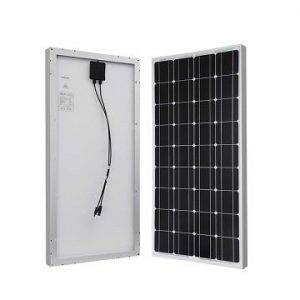
The Renogy kit comes at an affordable price and is similar to the winner of the list.
It includes MC4 connectors, mounting brackets and delivers 100 watts of power.
Under standard conditions, the system delivers 100 watts per day.
The 8 feet 10 AWG tray cable is included, so you can connect the panels to the battery.
Similar to the winner, the Renogy kit supports only four panels.
Pros
- Daily output of 5 kilowatts
- Includes negative grounding controller
Cons
- Limited to four panels
 Dylan's Take
Dylan's TakeI recommend the Renogy kit for people who wish to start with solar panels.
The system is reliable and reasonably priced for performance.
Allpowers 100W Flexible
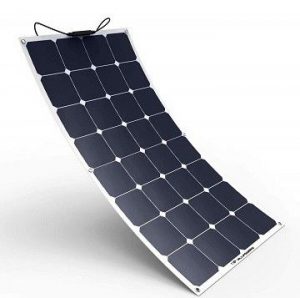
The AllPowers solar panel is impressive, it has outstanding performance packed in a lightweight and flexible solution.
The panels are flexible so they contour to the sun angle for the best results.
With less than 5 pounds of weight, panels are easy to move and help solar energy retention.
The convenient design delivers 5.0% more energy efficient than the traditional panels that cannot bend.
The panels are durable and water-resistance.
Pros
- Adjustable to the angle of the sun
- Panels can bend up to 30 degrees
- 18-month guarantee
Cons
- A bit compact
 Dylan's Take
Dylan's TakeThe panels come with an 18-month guarantee on the parts.
Because of the flexibility and great instruction, installing the panels is quick and easy.
HQST Off-Grid Solar Panel
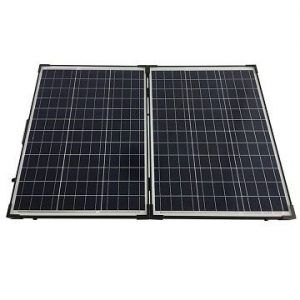
The HQST solar panels are created with people who like to go off the grid in mind.
The panels are foldable and come with an aluminum stand, traveling bag, and handles.
Overall, the product weighs 21.75 pounds of weight.
You can install the panels on the rough or run the cables through the window and install them up to ten feet of the system.
It can maximize your output.
The kit comes with a 20A controller, which works with a 12V or 24V system.
You also get a convenient LCD display for monitoring performance.
Pros
- Easy to install
- Lightweight
Cons
- You need to get several panels to ensure optimal output
 Dylan's Take
Dylan's TakeThe HQST kit is as simple as a solar kit can be.
It is also one of the most affordable models and has excellent energy retention.
Renogy RNG PV Solar Panel
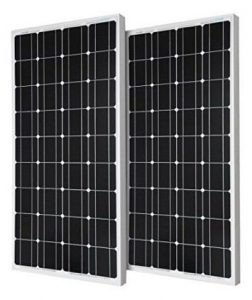
The Renogy solar panel gives out 50W of power per panel.
The system allows you to connect multiple panels, from two to six.
When you purchase more than one panel, you get a great discount.
These Renogy panels feature multilayered lamination encapsulation, which improves longevity.
Moreover, the panels have an aluminum frame for improved corrosion resistance.
Pros
- Excellent discount
- Lightweight
Cons
- To get optimal output, you need several panels
 Dylan's Take
Dylan's TakeI also like the aluminum frame because it keeps the panels safe and secured during high winds.
Overall, getting solar panels from Renogy is always a safe bet.
Buying Guide
Despite your love for your precious RV, there is room for improvement in efficiency and functions.
RV solar panels are the future and a great way to stay on track with the global efficiency trends.
Panels allow you to improve your energy independence, save money in the long run and pull up off-the-grid living.
Let’s go into detail about RV solar panels.
Solar Charge Controllers
The solar charge controller is the central part of the solar system.
It pumps electricity and has two functions – energy output optimization and blocking electricity to travel to solar panels without sunlight or reason.
The solar charge controller prevents blowouts or damage.
Deep Cell Cycle Batteries
Lead-acid batteries, commonly found in car batteries, are called deep cell cycle batteries.
You should fill and drain these batteries through controlled bursts of electrical output.
Because of that, deep cell cycle batteries work through a solar charge controller.
Battery Monitors
Battery monitors are sometimes called meters or gauges.
They look into the system and allow you to track when the system becomes defective through low or high output and have malfunctioned.
Battery monitors maintain your hardware and the quality of your life when you head off the grid.
Why Switch to Solar Energy Full Time?
Here are the benefits of going solar energy full-time:
Energy efficiency:
Solar energy supports your RV system evenly, not very different from standard on-site hookup.
A battery monitor shows you how quickly your RV is bringing solar electricity.
Overall, you won’t need to spend a lot of money on nightly hookups.
Independence
Going for solar panels allows you more energy independence, so you can stop enjoying the view anywhere.
It gives you much-needed freedom without worrying about charging stations.
Money-Saving
The solar panel is a long-term investment.
It will cost you more time when you first buy it, but it will save you more time and money over the years.
Why Choose Solar?
Switching to solar panels allow you to cut electricity costs, have more freedom, and cut down your carbon footprint.
Also, repairing solar systems is cheap, and the system is highly durable.
It can last from 25 to 30 years, similar to standard solar panels.
Solar Kits VS Solar Panels
Let’s see what a solar panel is and how it differs from the solar kit.
Solar panels are panels without solar charge controllers, cables, and sometimes without mounting equipment.
Solar kits include panels, adapters, controllers, and everything you need for mounting.
A solar kit is a small system, designed to work with something like a boat or RV.
Can I Use Standard Solar Panels?
Standard solar panel, designed to work on the home, has complex wiring and cables because it requires electricity to run through electrical current.
Using solar panels on your RV requires different wires are panels specifically designed for the RV.
How Do Solar Panels Work?
Solar panels have been around for a century before people appreciated their usability.
They allow particles of light to separate electrons from atoms.
The process results in electricity in the photovoltaic cells’ housing.
Standard solar panels come with 32, 36, or 48 photovoltaic cells.
Each cell makes one-quarter of a volt.
By doing the math, we understand that a 48 cell panel is enough for 12 volts.
Panels Types
There are two types of solar panels – monocrystalline and polycrystalline panels.
The monocrystalline panel uses one cell, while polycristalline includes many cells working at a time.
Therefore, monocrystalline cells are more energy efficient.
Because of that, these panels are better suited for RV.
How to Understand Efficiency Rating on Solar Panel?
Solar panel efficiency rating tells you how much energy a solar panel can store, expressed in percentage.
Still, there are no solar panels with 100%.
Currently, the highest efficiency is 22%, but for RV 14% is considered good.
How Long a Solar Panel Last?
The average lifespan of a solar panel is from 25 to 30 years.
The lifespan depends on wear and tear, and the amount of direct sunlight.
How Many Solar Panels To Get?
There is no such thing as too many solar panels because the solar charge controller will prevent deep cycle batteries from overcharging.
Get as many solar panels as you can.
The number depends on your available space and energy needs.
How to Find out Your Hourly Energy Consumption?
There are so many terms related to electricity, so one can easily get confused.
Remember: Watts x volts = amps.
So, if an item is registered for 25 watts on your 12-volt system, you can determine the amperage consumption.
Go through all the appliances that need energy using the same formula.
That way, you can determine your hourly consumption, and therefore get enough solar panels to cover your daily energy needs.
Installing Solar Panel on the Roof
It is easy to install a solar panel on an RV roof.
Install panels on a flat surface and secure them to the roof.
Bolt the panel directly to the roof, but it will require you to prevent leaking.
The better alternative includes pre-installation.
Therefore, put the multiple panels on the roof, measure their velvet and install two wooden beams on the roof by drilling holes.
Cover the holes and put a panel over them.
Run the wires through your system.
You can use existing vent pipes, or drill separate holes.
Bolt the panels and set up the system following the manufacturer’s instructions.
Implementing Solar Circuits
Now we are talking about complex tasks.
The wires from the previous section need to be connected with the charge controller and through it, with batteries.
You should use an inverter attached to your battery, which will provide you standard 110V/120V outlet, suitable for most home appliances.
It is the easiest method, as it doesn’t require technical integration.
Things to Look For in an RV Solar Panel System
Let’s break things down about important aspects of solar panels for RV, so you can find the system for you.
Size
Find out the weight of the panel because your rooftop can hold limited weight.
Also, hooking up heavy solar panels is difficult.
Check the owner’s manual to find out your roof weight capacity.
But, multiple solar panels of 20 pounds will work in most cases.
Power
Determine your power needs and consider your expectancy of solar panels.
Check the kWh rating, calculate the hourly consumption and production of amps of electricity.
For example, a 12-volt panel of 100 watts makes 8.33 amps of power per hour.
Is enough for you?
Using Off-The-Grid
People who often go off-the-grid or plan to do it full time, need to build a reliable system to power their light and home appliances.
When cloudy weather hits, it can be difficult, so store as much power as you can and invest in a large power bank system.
Determining the Needs for Solar Panels
If you are wondering if you need to go solar, the answer is yes in most factors.
You don’t have to switch to solar full-time.
Start by partially using solar panels for power needs.
Think about the number of people you are RVing, your appliances, electronics, habits, use, needs, long-term savings, and investment.
Assess your needs and get the model that is good for a start. You can always upgrade and switch to full-time solar.
Conclusion
Once you install solar panels, you will ask yourself why haven’t you went solar sooner.
Solar energy isn’t the only trend, it is a developing industry whose products improve your life, and are good for the environment.
Sooner or later, you will have to switch to a sustainable energy source, so why not start immediately?
Tell me, which solar panel is your top pick!
Best Overall Choice
WindyNation 100 Watt Solar Panel Kit

We're a team of professional travelers, on-the-go freelancers, web producers, writers and editors. Our mission is to pick the best travel gear by analyzing customer opinions and writing our own findings to help you find the right products for you. Please share our posts to help us grow. Read more...
